Restaurant workers have each other’s backs as layoffs and confusion abound
One chef offers free, daily ‘family meals’ to industry workers, whose futures are uncertain due to restaurant and bar closures, layoffs and confusion.
Listen 3:48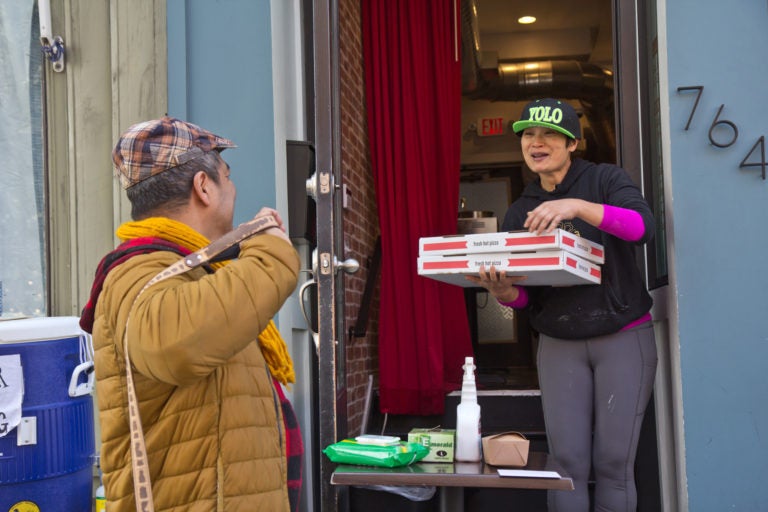
Kalaya owner Nok Suntaranon (right) hands out donated pizza to community members in need. (Kimberly Paynter/WHYY)
Anyone looking to stretch their legs for an afternoon stroll down on Ninth Street in South Philly is in for some aggressive generosity.
“Would you like some pizza?” Nok Suntaranon called from her restaurant’s open door to an unsuspecting neighbor passing by. “Just take some pizza!” she insisted.
Despite her enthusiasm, Suntaranon is far from a pizza-maker. She is the chef-owner of Kalaya, a small Thai restaurant on the north end of Philadelphia’s Italian Market. She closed her dining room after Pennsylvania Gov. Tom Wolf issued his statewide order to stop the spread of the new coronavirus, but she wasn’t prepared to stop serving food. She knew the impact this would have on restaurant workers citywide, and so she sprung into action.
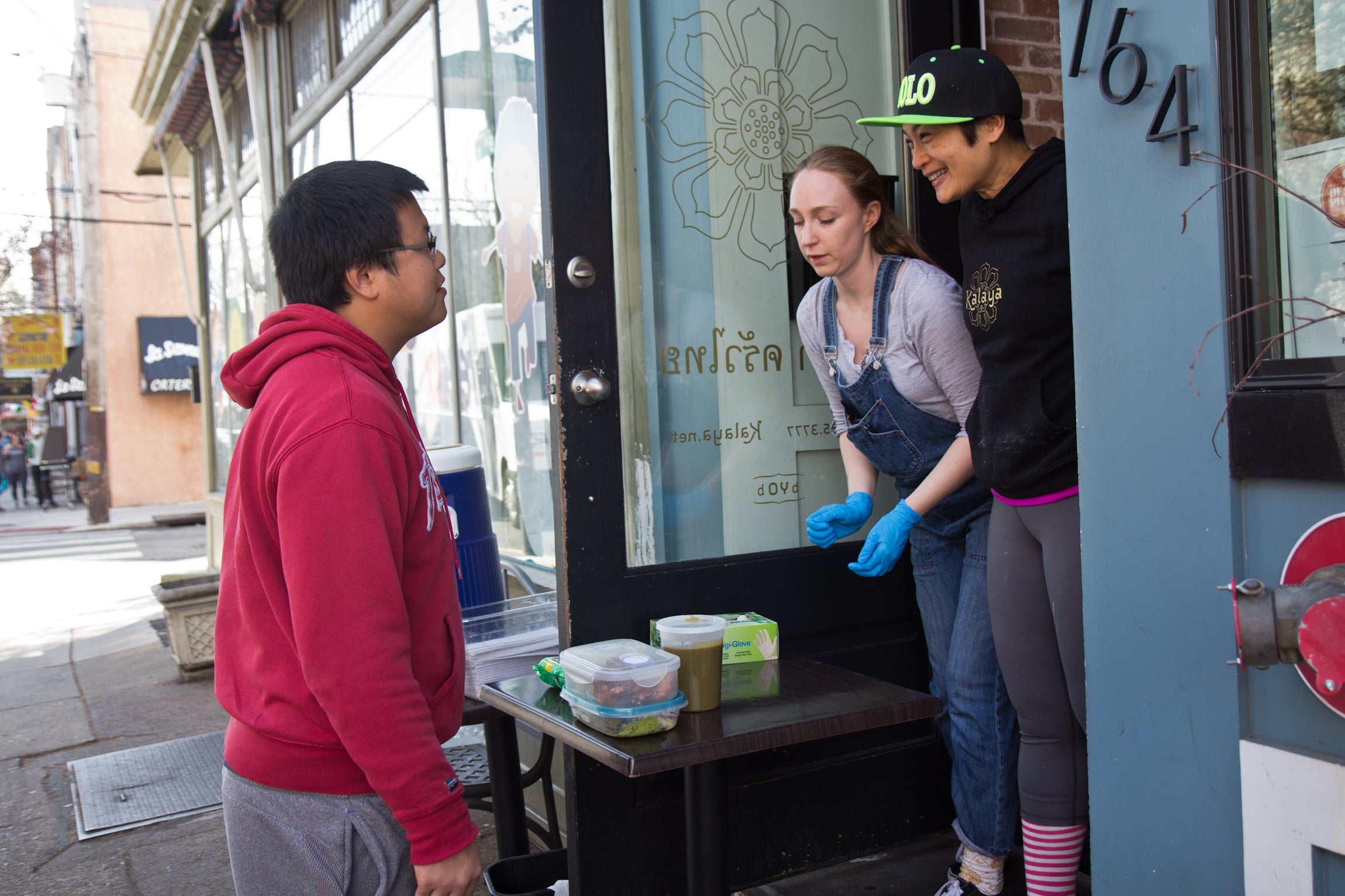
“When this happened, instead of thinking about myself, I took a minute and I think about them,” Suntaranon said, donning a fitted baseball cap with YOLO printed across the front in neon green. “People in the restaurant industry gonna get laid off. They won’t be able to have anything to feed themselves for a very long time.”
Suntaranon’s original plan was to make a huge batch of pasta every day and give it out for free to service workers between 3 and 5 p.m. She called it “family meal,” the term often used for the meal restaurant staff eat together before or after a shift. But Suntaranon quickly realized that as many restaurants across the city were shutting down or reducing hours, they had tons of leftover food they needed to get rid of. So she posted a video on Instagram asking people to bring any extra food they had in their walk-in freezers to her. She would make family meal out of whatever she got each day.
On her first day, Tuesday, she fed about 75 people, she said.
“This is not new for us,” said Suntaranon, who grew up in Thailand. There, she said, her mother (for whom the restaurant is named) cooked huge batches of food for all her neighbors. After moving to Philadelphia, Suntaranon hosted community dinners in her Bella Vista neighborhood before opening Kalaya 11 months ago.
“We did this for people all the time. Our kitchen is always open,” she said.
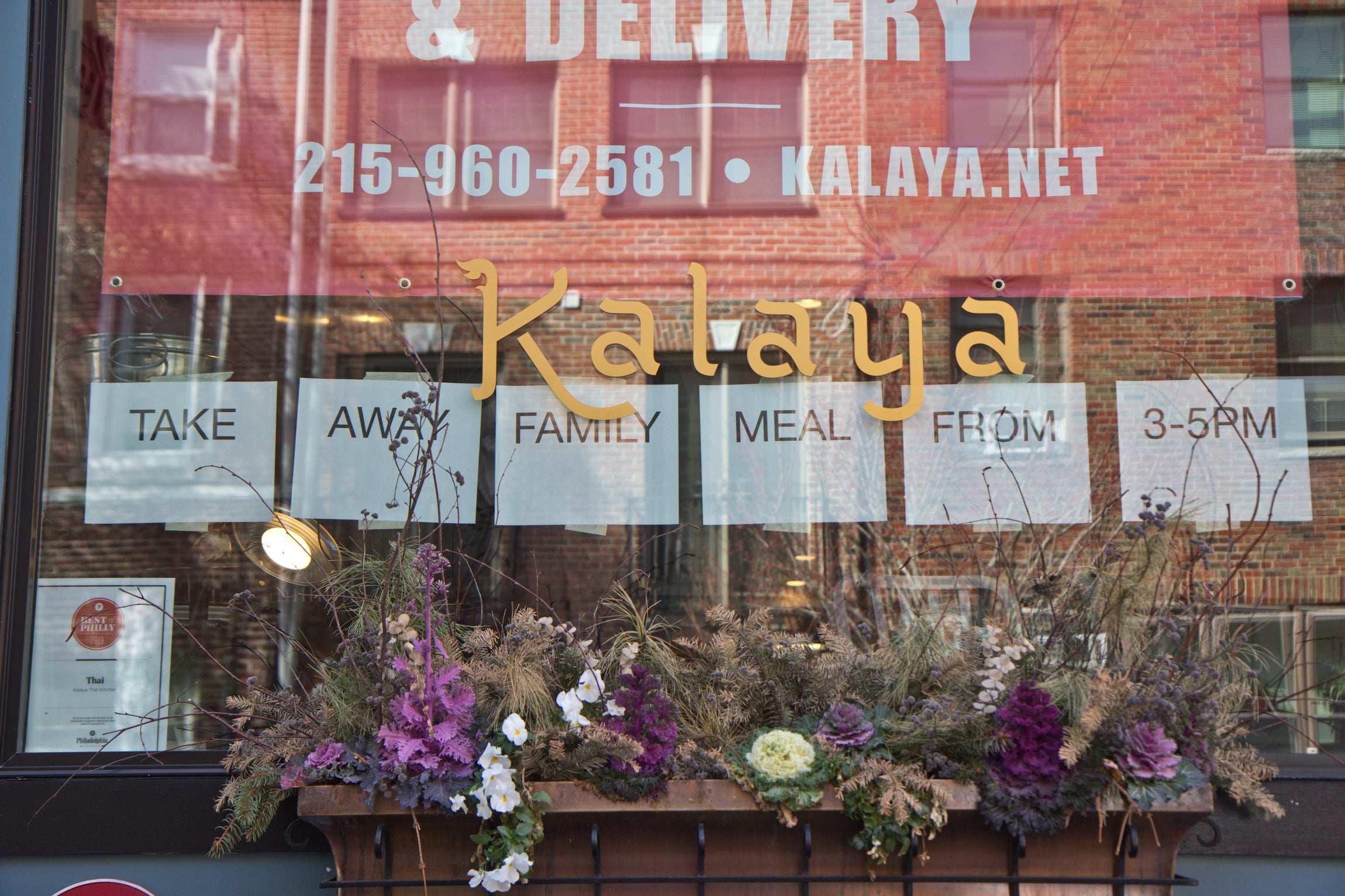
Wednesday afternoon, servers, chefs and bussers came by Kalaya, bearing their own plastic containers. A team of the restaurant’s staff and other service industry volunteers who are out of work loaded their plates with mac and cheese from Mike’s BBQ and topped it off with cannoli cake from Ralph’s next door.
“When the governor put the restrictions out, we were told to file for unemployment and like play it by ear from then on,” said Leo Dowd, 23, who works as support staff at Bud and Marilyn’s. “So we’re like not really sure, and neither are our bosses. It’s just kind of a situation that nobody has had to go through.”
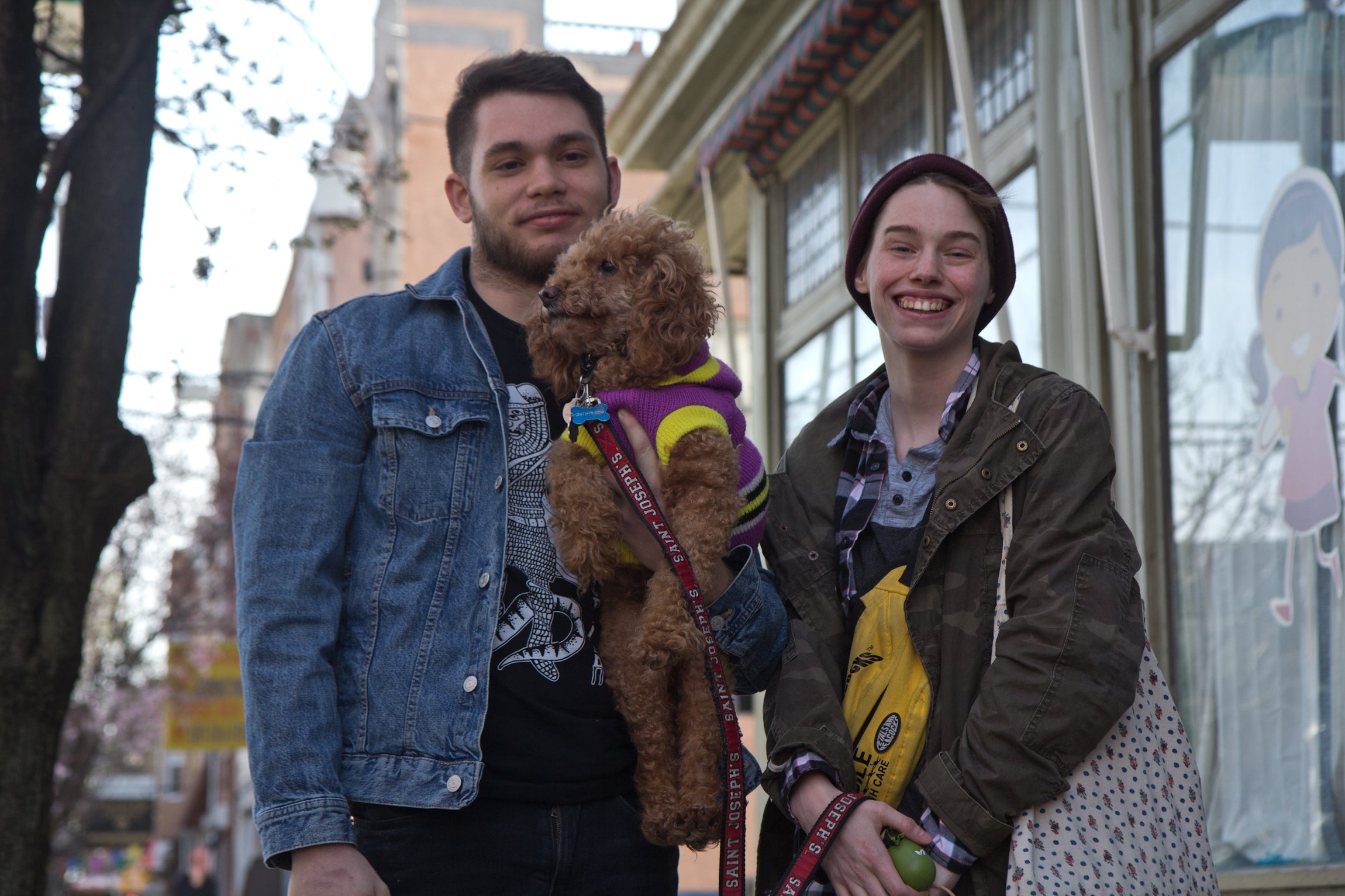
Troy Wilson, a 25-year-old chef at Musi, agreed. “I don’t know if I’m gonna have a job when this is over,” he said. “Nobody does.”
According to the U.S. Bureau of Labor Statistics, the Philadelphia region employs more than 200,000 hospitality and leisure industry workers.
State officials report receiving 120,000 unemployment claims since Wolf ordered a statewide shutdown of all nonessential businesses on Monday.
On Wednesday, the governor requested a disaster declaration so small businesses and nonprofits could obtain loans. Up to $2 million will be available in assistance for small businesses at a 3.75% interest rate for those without credit available elsewhere and 2.75% for nonprofits.
The pizza Suntaranon was pushing came from Pitruco, a wood-fired pizza food truck with a brick-and-mortar location in University City.
“We closed very abruptly,” said Nathan Winkler-Rhoades, who co-owns Pitruco and delivered the pies. “We planned to stay open on a takeout basis for the next couple weeks and kind of came to feel, as soon as we’d made that decision, that it was made not out of rational thinking about keeping our employees safe and … doing our part for the good of public health in Philly, but out of a desire of to not have to throw food out and to keep selling our food.”
When they decided to close, said Winkler-Rhoades, they had already prepared a lot of pizza toppings and dough. After seeing Suntaranon’s Instagram video, he figured the best use of the ingredients were to cook them up and bring them over.
Nadia Tran, a 22-year-old server at Southgate in Graduate Hospital, grabbed a couple slices.
“It just sucks because we rely on customers and people actually dining in to live,” she said, noting that Southgate was still offering takeout but didn’t need its full staff for that.
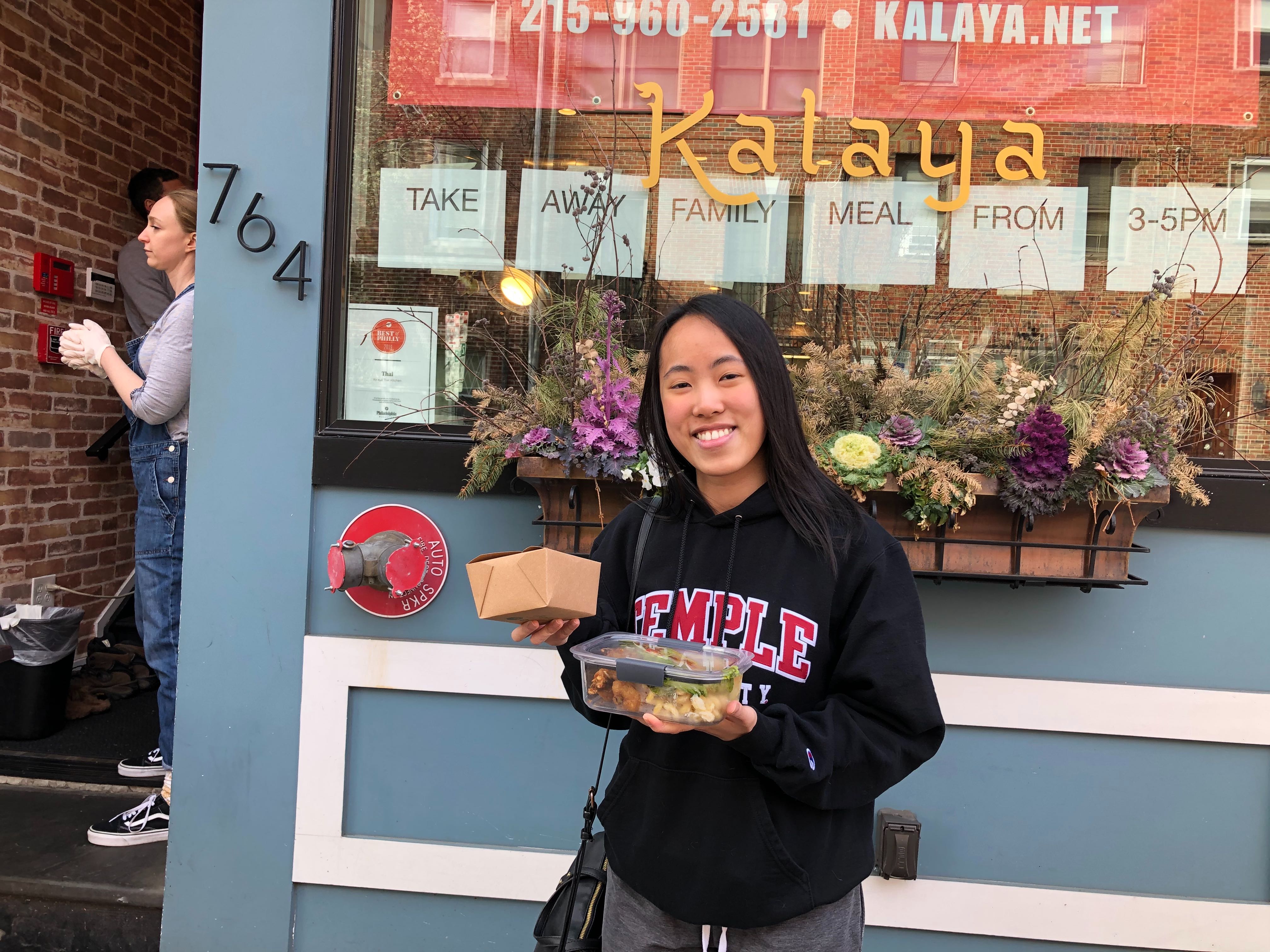
“We’re not getting paid, but we’re not laid off either. Everyone’s on this suspended thing,” she said, echoing the state of confused limbo expressed by many workers.
The City of Philadelphia requires employers to offer sick leave, and for employers with more than 10 employees, it must be paid leave. On Monday, the city expanded its sick leave law to cover those employees whose places of work were ordered to shut down due to coronavirus concerns. According to city law, employers must allow their employees to use all accrued sick time before laying off employees, even if the employee did not request to use the time.
In many cases, that’s not happening. Employees for the STARR Restaurant group were told they could not use their vacation, sick or paid time off when businesss shut down in response to the governor’s orders.
“It is with a heavy heart that I tell you that we are not able to financially support paying our employees in all the ways we want to during this crisis,” wrote Stephen Starr in an email to all employees. “Our intention is to be sure that we have a company to bring everyone back to in what we hope will be the very, very near future.”
The company, which employs 6,000 workers at restaurants in Philadelphia, Atlantic City, Washington D.C and elsewhere, is providing medical insurance through the end of April. Stephen Starr did not return a request for comment.
Workers can apply for unemployment compensation if their hours are reduced or if they are laid off – they do not have to lose their jobs to be eligible.
Undocumented workers, many of whom work in the back of house for restaurants across the region, would not qualify for unemployment.
Kalaya, which is still open for takeout and delivery, is not the only restaurant offering family meals. Community kitchens are popping up all over to help service industry workers in time of need. Suntaranon said she plans to keep the afternoon meals going as long as she can.
“I think the restaurant business is about service,” she said. “It doesn’t matter how much we make money now, but at least we [are] here and giving people the service they need for this difficult time. That’s what we are all about. That’s what the food industry should be all about.”
WHYY is your source for fact-based, in-depth journalism and information. As a nonprofit organization, we rely on financial support from readers like you. Please give today.


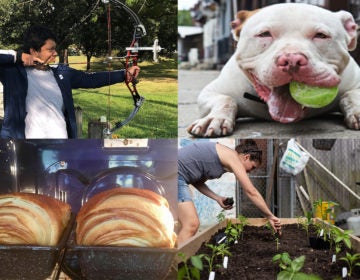
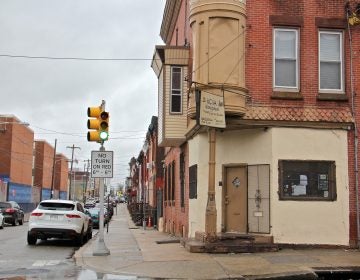

![CoronavirusPandemic_1024x512[1]](https://whyy.org/wp-content/uploads/2020/03/CoronavirusPandemic_1024x5121-300x150.jpg)


